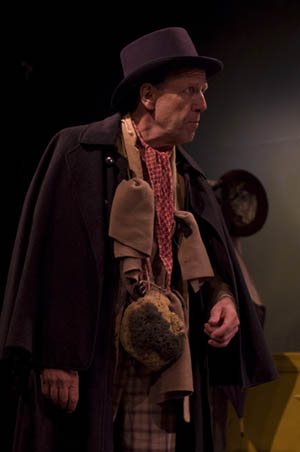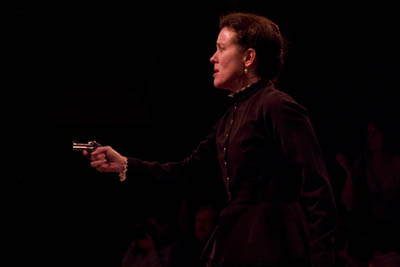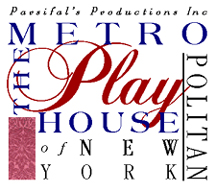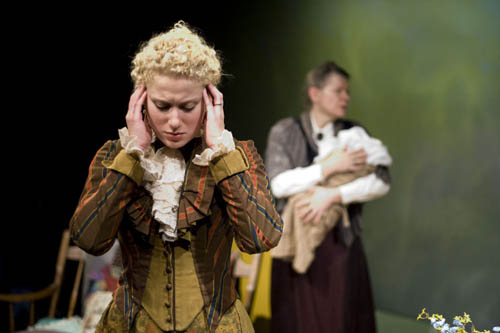Margaret
Fleming
Written
by James A. Herne
The story of
Margaret
Fleming is a case study in a great work of art born well before its
time. It is also an illustration of the subtle power of a fine
play
that, like its titular character, is far mightier than its unassuming
appearance suggests.
Written in 1890,
when the
popular fare was sensational potboilers and sentimental melodramas,
Herne’s play was something new. In a contemporary critic’s words, it
was “A simple, veracious, sincere picture of life.”*
Unfortunately,
the public
did not want simple sincerity, and Margaret Fleming failed at the box
office. New York reviews were particularly excoriating, and Herne
lost
his substantial investment in the play. He recovered by producing
more pleasing
works, but Margaret Fleming did not find her stride until a
Chicago triumph five years after the author’s death, when it was hailed
as “one of the strongest, best plays yet written by any American .... a
creation to which we as a literary and a stage-possessing nation may
point with justifiable pride.”**
With such
adulation,
could if have merely been novelty that earned its earlier condemnation?
We suspect that its early failure owed not merely to its being
truthful, but revelatory in its colloquial form. It is so moving,
funny, and provocative a play in its simple sincerity that it was
unsettling to its first audiences. In their very humanity, its
characters strike deeply as more sensational characters could
not.

Margaret
is the dutiful,
devoted, and comme il faut wife of small city mill owner, Philip
Fleming. Entitled son of the industrious founder of the mill,
“Live
and let live’s my motto,” he says, but he has been living too
carelessly. The play begins when he is confronted with the child just
born to his working class mistress. His solution is to conceal
his
predicament with cash and winks, but fate will not have it so: Margaret
discovers the child and the affair. Her response drew affronted
gasps
and censure from an 1890 audience, and it is as surprising today.
Suffice to say, it defies conventions! And in it, an unassuming young
wife discovers the power of her independence and love.Here, then, is the
power
of the play: it is the same as its heroine’s. She is
wrenched from a
sheltered and naïve life, which she lives according to Victorian social
rules, and she realizes her strength and potential simply by being true
to herself. Equally, the play subverted the prevailing theatrical
“rules”, and revealed how powerful the stage can be when it aspires to
truth.
With that power,
Margaret
Fleming probed deeply into the injustices of its day. The “evils”
in
the play’s world are not such melodramatic standards as lust,
inebriety, or greed—though all are present—but rather the arrogance of
the privileged, the inhumanity of the
moralistic, and the double
standards of a “man’s” world.At the
end of the gilded
age, waning industrial profits inspired
heated protectionist debates in
Washington, great surges of immigration led to increasingly miserable
conditions for poor industrial workers, and women were still struggling
for the vote. Each of these concerns colors Margaret Fleming, yet
its
“big” issues are tied to its human characters, so they are matters of
personal compassion, not social justice. As such, they touch us more
personally. privileged, the inhumanity of the
moralistic, and the double
standards of a “man’s” world.At the
end of the gilded
age, waning industrial profits inspired
heated protectionist debates in
Washington, great surges of immigration led to increasingly miserable
conditions for poor industrial workers, and women were still struggling
for the vote. Each of these concerns colors Margaret Fleming, yet
its
“big” issues are tied to its human characters, so they are matters of
personal compassion, not social justice. As such, they touch us more
personally.
That
the issues of 1890
are not so far from our own in 2007 is one more delight in reviving
this under-appreciated work. Seen through a hundred twenty year
old
drama of artful fidelity to commonplace people, these concerns take on
a new and meaningful life. Indeed, the very qualities that earned its
censure in the 19th century are what make it so powerful today. It is
simply, sincerely, human. And nowhere could that humanity be more
present than on Metropolitan’s intimate stage.
We are
honored to give a new life to an important play, inaugurating
Metropolitan’s 16th season: the Season of Virtue.
-Alex
Roe |



